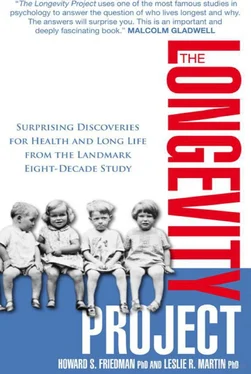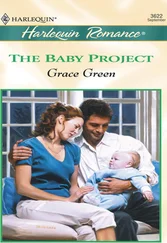Howard S. Friedman, Ph.D., and Leslie R. Martin, Ph.D.
THE LONGEVITY PROJECT
Surprising Discoveries for Health and Long Life from the Landmark Eight-Decade Study
To Dr. Terman, the Terman participants,
and our many fellow Termanators
The Breakthrough Studies of a Lifetime
In September 1921, a talented young schoolgirl named Patricia and her precocious classmate John were pulled out of their San Francisco classrooms by a Stanford University psychologist, Lewis Terman. Dr. Terman was looking for gifted children and had asked their teachers to pick out the brightest kids in the class. He was interested in the sources of intellectual leadership and wondered if he could identify early glimmers of high potential.
Eighty years later, both Patricia and John were still alive at ninety-one years old. They had beaten the odds and lived very long and healthy lives. What was their secret? In an effort to find out, we have spent the past twenty years following up on the people in Dr. Terman’s studies and investigating why some people thrive well into old age while others fall ill and die prematurely. Along the way, we’ve discovered that many common health recommendations are ill-advised or simply wrong. We’ve replaced those with more accurate guideposts to a longer, healthier life.
The 1,500 or so bright boys and girls selected by Dr. Terman were born around 1910. Almost all of them are now gone. We have documented when and how they died, and we have studied their lives in meticulous detail. Although many died by their sixties, many others aged in good health and lived well into old age. Surprisingly, the long-lived among them did not find the secret to health in broccoli, medical tests, vitamins, or jogging. Rather, they were individuals with certain constellations of habits and patterns of living. Their personalities, career trajectories, and social lives proved highly relevant to their long-term health, often in ways we did not expect.
The usual piecemeal suggestions given to those who want to improve their health (“relax,” “eat vegetables,” “lose weight,” “get married”) are lifesaving for some but neither effective nor economical for many. In fact, standard medical advice often backfires, leaving us overweight and overstressed as we struggle to follow specific edicts. Our society spends a fortune on health care, fad diets, pharmaceuticals, and a variety of short-term remedies that help somewhat; but there is often disappointingly little effect on our long-term health and longevity.
The late comedian and actress Lucille Ball had her own secret to staying young: live honestly, eat slowly, and lie about your age. 1 1 Lucille Ball’s secret to staying young is quoted in A. Adams, An Uncommon Scold (New York: Simon and Schuster, 1989), 17. Regarding the matter of eating fast (among the Terman participants), relevant information was recorded during a comprehensive medical exam the children underwent in 1922 in either San Francisco or Los Angeles. About half the boys and more than a third of the girls were classified as fast eaters. When we analyzed the longevity data eighty-five years later, we found absolutely no indication that eating slowly promotes longevity.
Lucy was both right and wrong. Living honestly, our data show, really can be important, but eating slowly doesn’t much matter. Lying about your age and your health does indeed represent a challenge to health researchers, but we have figured out ways to outwit the Lucys of the world and get around this common source of research bias.
In our studies we focus first on longevity—length of life. Many studies of well-being are flawed because they rely too heavily on participants’ answers to queries about their health and wellness—called their “self-report.” Their self-reported answers are subjective and often inaccurate. Longevity is not distorted by self-report. Although there is a field of study on the reliability of death certificates, it is pretty much the case that if your death certificate says that you died on April 26, 1989, then we can be reasonably certain of your longevity and of your state of health on that date. Lucille Ball was not a participant in Dr. Terman’s studies, but, as we shall see, one of her closest associates was.
Many common beliefs about health and longevity come from a host of biased sources—with distortions that go well beyond the self-report biases. Aside from the self-interest research biases we hear so much about (in which someone has a financial stake in the findings), there are also many sources of inadvertent skew or error. If you think about it—as we do every day in our laboratory—you come to realize that we can never be quite sure about the validity of many health studies and claims.
Of course we can study individuals who stay healthy, but to whom do we compare them? If we knew that two people started out exactly the same at birth but one ate only broccoli while the other ate only fried steak, then we might have a reasonable comparison. But almost all epidemiological studies, even those making daily headlines, compare people who differ in many, many ways. Indeed they differ in ways we cannot know about. Most comparisons of vegetarians and cheeseburger addicts, or of pill-takers and the pill-averse, therefore are necessarily somewhat flawed. The researchers generally do their best to be as accurate as possible, but there are always limits in a complex study of human health. And the statistics that emerge from the studies can be interpreted in many different ways.
One of the best ways to avoid research traps and biases is to follow individuals for their entire lives and see which characteristics influence subsequent qualities, behaviors, and outcomes. What exactly causes people with similar backgrounds to diverge in terms of their health and well-being? This step-by-step procedure is exactly what we have done, and this book is the first comprehensive report of the findings.
Tracing the lives of hundreds of individuals, we have discovered new twists to common health recommendations, such as when staying single or getting divorced can be healthy for women. Our studies have uncovered a series of what we call dead-end myths—common advice that is not supported by good science and can lead to dead ends in more than one sense of the term. Throughout this book, we’ll explain exactly why the following common beliefs, to name a few, are false :
The best of men cannot suspend their fate: The good die early, and the bad die late. (Myth!)
Get married and you will live longer. (Myth!)
Take it easy and don’t work so hard and you will stay healthier. (Myth!)
Thinking happy thoughts reduces stress and leads to long life. (Myth!)
Religious people live longer, so don’t miss religious services. (Myth!)
If you have hobbies like gardening, walking, and cooking, you should take up more vigorous forms of exercise. (Myth!)
Worrying is very bad for your health. (Myth!)
If you believe that you are loved and cared for, then you are on the road to good health. (Myth!)
Retire as soon as you can and play more golf to stay healthy and live longer. (Myth!)
If your child is very serious, encourage him or her to be more spontaneous and have more fun. (Myth!)
Give your children a big head start in school and they will thrive for life. (Myth!)
You can live to be a hundred only if you give up all the things that make you want to live to be a hundred (as Woody Allen is said to have joked). (Myth!)
Читать дальше












